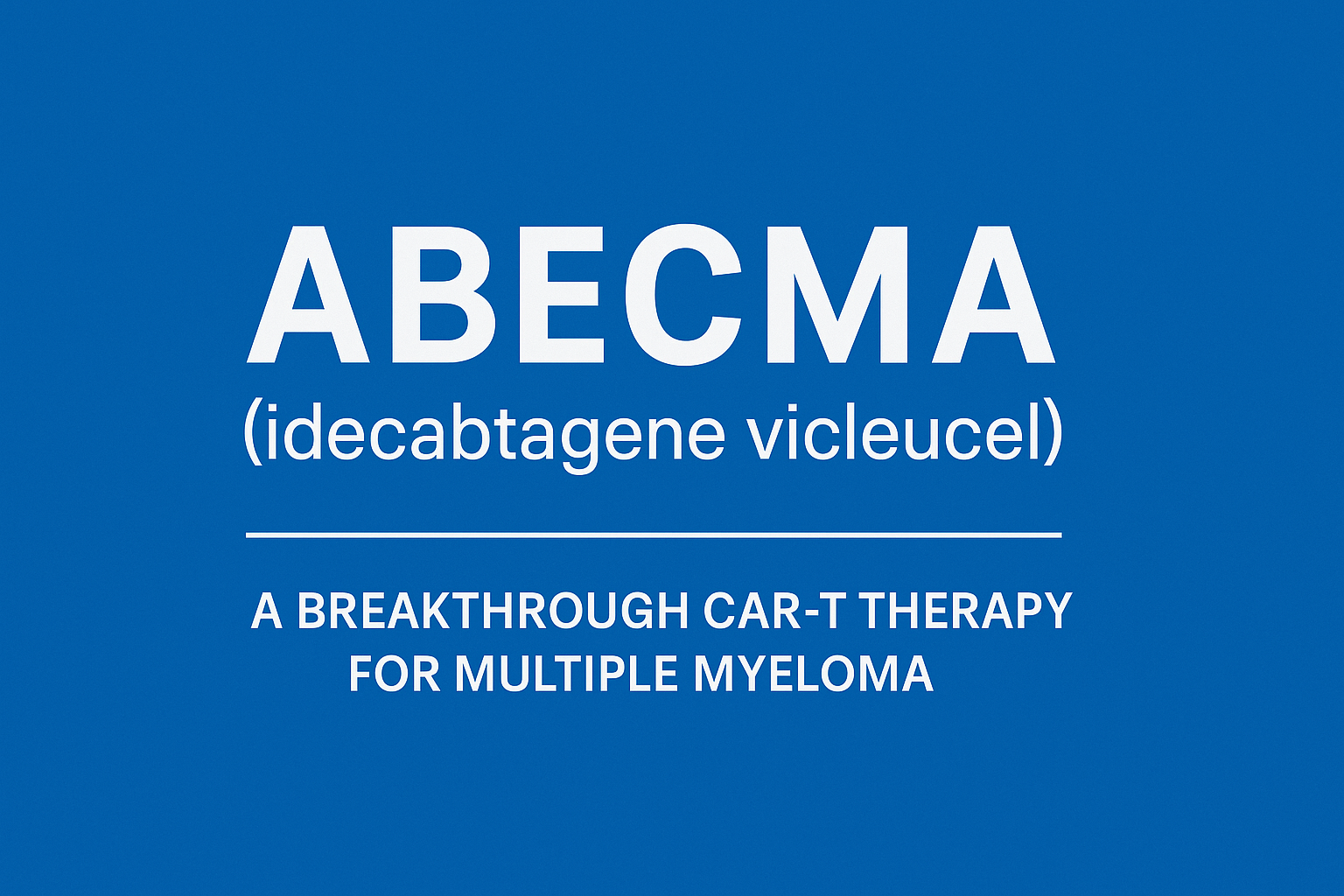
1. Overview & Therapeutic Role
Abecma represents a pioneering BCMA-targeted CAR T‑cell therapy for adults battling relapsed or refractory multiple myeloma, particularly those who have been treated with immunomodulators, proteasome inhibitors, and anti‑CD38 antibodies. It leverages a patient’s own immune cells to seek and destroy myeloma cells efficiently. Approved by the FDA in March 2021, it marked a pivotal advancement as the first cell-based gene therapy endorsed for this indication. Drugs.com+1Wikipedia
2. Treatment Protocol & Administration
This treatment involves a multi-step, personalized process:
- Collection & modification of the patient’s T-cells to express CARs targeting BCMA.
- Lymphodepletion—typically with chemotherapy agents such as cyclophosphamide and fludarabine—to create a supportive environment for CAR T-cells to expand.
- Single-dose infusion, usually within the range of 300–510 million CAR-positive T cells.
- Supportive care including fever reducers or antihistamines as premedication, and readiness to manage side effects like cytokine release syndrome (CRS) with therapies such as tocilizumab.
3. Efficacy at a Glance
In pivotal clinical trials:
- Overall response rate: ~72% of patients achieved either full or partial remission.
- Complete response: Observed in approximately 28%, with many maintaining it for at least a year. Wikipedia
4. Safety Profile & Key Risks
Abecma carries several black-box warnings because of its potential for serious adverse events, including:
- Cytokine Release Syndrome (CRS)
- Neurologic toxicities
- Prolonged cytopenias
- Secondary hematologic malignancies
Common side effects seen in trials include fatigue, fever, infections, musculoskeletal pain, and immune suppression (e.g. low IgG levels or hypogammaglobulinemia). Drugs.com+15Wikipedia+15Drugs.com+15Drugs.com+3Drugs.com+3Drugs.com+3
5. Ideal Patient & Clinical Considerations
Abecma is tailored for patients who:
- Have undergone multiple prior therapies (≥ 3 different drug classes) for relapsed/refractory multiple myeloma.
- Are medically fit to undergo lymphodepletion, handle CAR T-cell infusion, and be monitored closely for adverse events like CRS or prolonged cytopenias.
6. Why Abecma Matters
- Breakthrough innovation: It harnesses cutting-edge immunotherapy to offer hope where standard treatments may have failed.
- Durable responses: With significant rates of complete and sustained remission, it has become a critical option in the multiple myeloma treatment landscape. Wikipedia+1
- Tailored care: Its personalized nature highlights the shift toward precision medicine in oncology.
Abecma (Idecabtagene Vicleucel) – Summary Table
| Category | Details |
|---|---|
| Brand Name | Abecma |
| Generic Name | Idecabtagene vicleucel |
| Drug Type | BCMA-directed CAR T-cell immunotherapy |
| Indication | Treatment of relapsed or refractory multiple myeloma in adults who have received ≥ 3 prior therapies (including an immunomodulatory drug, a proteasome inhibitor, and an anti-CD38 monoclonal antibody) |
| Approval Date | FDA approval: March 26, 2021 |
| How It Works | Patient’s T-cells are collected, genetically modified to target BCMA on myeloma cells, then reinfused to attack and kill cancer cells |
| Administration Route | Intravenous infusion (one-time dose) |
| Recommended Dose | 300–510 × 10⁶ CAR-positive T cells (single infusion) |
| Pre-Treatment Steps | Lymphodepleting chemotherapy (cyclophosphamide + fludarabine), premedication with acetaminophen & antihistamine, tocilizumab availability |
| Common Side Effects | Fatigue, fever, nausea, diarrhea, headache, infections, muscle/joint pain |
| Serious Risks (Boxed Warnings) | Cytokine Release Syndrome (CRS), neurologic toxicity, hemophagocytic lymphohistiocytosis/macrophage activation syndrome (HLH/MAS), prolonged cytopenias, secondary malignancies |
| Laboratory Risks | Low blood counts (neutropenia, thrombocytopenia, anemia), low immunoglobulin (hypogammaglobulinemia) |
| Response Rates | ~72% overall response; ~28% complete response in clinical trials |
| Monitoring Needs | Close observation for at least 7–14 days post-infusion; long-term follow-up for blood counts, immune function, and secondary cancers |
| Special Considerations | Not for patients with active infection, pregnancy, or certain health conditions; may affect vaccine timing |
| Manufacturer | Bristol Myers Squibb |

Leave a Comment